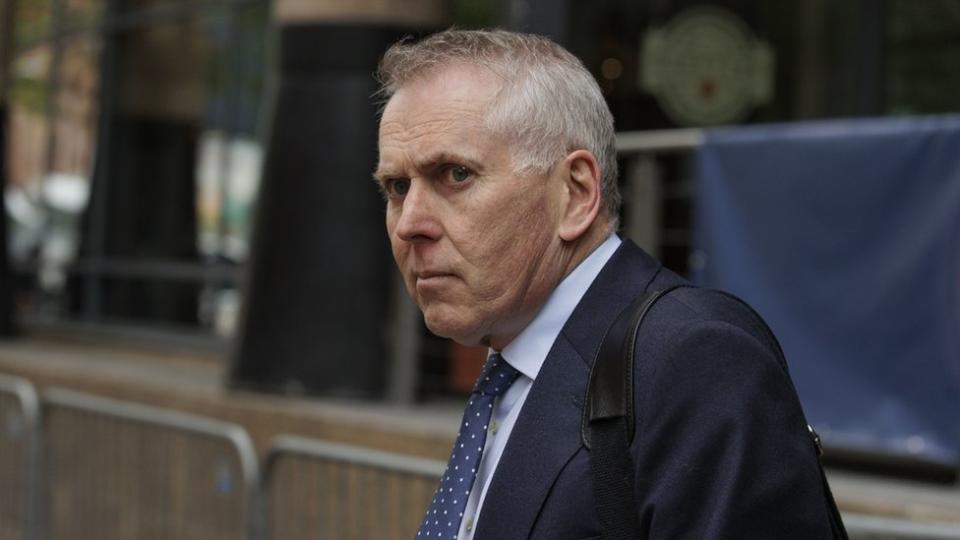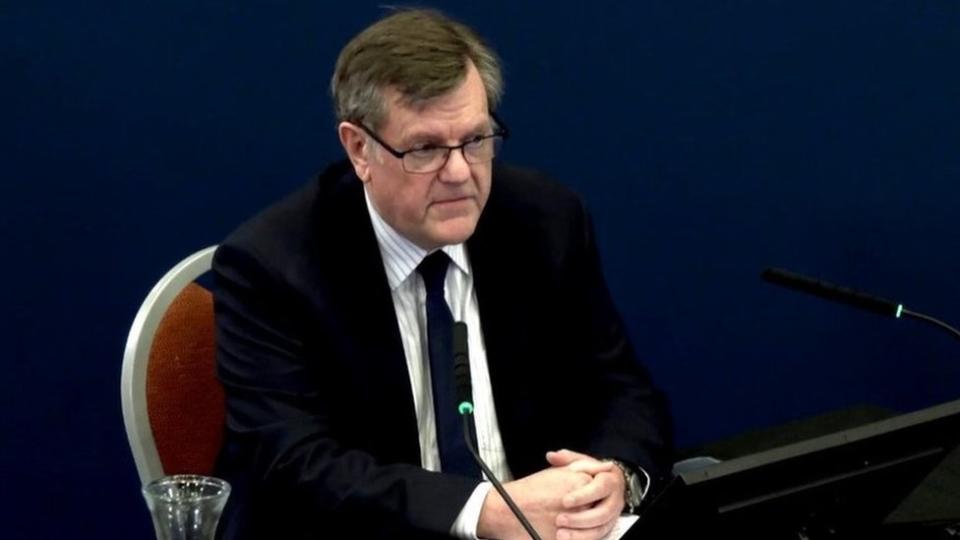Covid-19 Inquiry: Idea floated to replace Swann as health minister
A senior civil servant floated the idea of replacing Robin Swann as Northern Ireland's health minister during the Covid pandemic to allow the larger parties at Stormont more control.
The suggestion about Mr Swann is contained in a batch of documents published by the UK Covid Inquiry.
It is currently sitting in Belfast.
On Thursday, the inquiry also heard of the impact that severe understaffing of Northern Ireland's Civil Contingencies Hub had on resilience to the pandemic.
In the document, the senior official recognised the idea was "radical" and may not be "palatable".
It was to ask Mr Swann, an Ulster Unionist minister, to take on a different ministry during the pandemic to allow a DUP or Sinn Féin politician to take on the key role in health.
The context was an email exchange between civil servants in the early days of the pandemic, at the end of March 2020, when ministers were working out how best to deal with the developing public health crisis.
An email from the then head of the civil service, Sir David Sterling, to fellow officials quoted the then deputy first minister Michelle O'Neill telling him "we need to be driving this crisis, we need to be in control".
Sir David wrote: "She is clearly frustrated with being a first minister but actually having little power or influence over the health service.
"FM [Arlene Foster] is more circumspect, recognising the 'operational independence' of the health minister.
"Though she too is frustrated at the lack of information coming out of DoH [Department of Health] coupled with frequent surprises eg today's announcement that hospital visits are to end."
It was in response to this email that a senior official in the Department of Finance at the time, Hugh Widdis, made his reshuffle suggestion, amid a range of different proposals.
He wrote: "There would be more radical options but I presume that they aren't palatable eg: asking Robin to take a different portfolio for the duration (they would have to make a tempting offer) and putting a SF or DUP Minister in?
"Or causing d'Hondt to be run again."
He had other less radical suggestions, like developing an emergency programme for government, or creating "an all-Exec overarching Covid strategy" which the first and deputy first ministers "can lead and own".
A real crisis... and it is scaring them
As part of the same exchange of emails between civil servants, Karen Pearson, from the Executive Office, pointed out that ministers were still finding their feet after the recent resumption of devolution.
Among her observations were that "ministers are just back … a new ministerial team … a real crisis which they can not control and it is scaring them".
Mr Swann remained as health minister during the pandemic, and recently returned to the job when devolution was restored earlier this year.
In his email at the end of March, Sir David raised another issue.

He said the deputy first minister "revealed what has been increasingly clear with Sinn Féin ministers in recent days is a growing fear of being held corporately responsible, or liable, if things go badly wrong".
He added: "We need to find a way to get them off this hook.
"If it becomes clear that their main priority is to lay out an audit trail and avoid any future blame then everyone else will do the same thing.
"And we'll be paralysed."
The email was sent just after 21:00 on Thursday, 26 March, 2020.
He ended the note saying: "Need to sleep on these two challenges."

'Resilience at a senior level'
In his evidence to the inquiry on Thursday, Chris Stewart, who worked for The Executive Office, said on 12 March 2020 there were only four people working in the Civil Contingencies Hub when there should have been at least 28.
Mr Stewart said: "It is unfortunate that we hadn't given enough thought to resilience at a senior level."
The Civil Contingencies Hub was set up to respond to emergencies such as weather conditions but was employed to deal with a potential no-deal Brexit and the pandemic.
In an email from Mr Stewart to the head of the civil service, he said that the hub's only member of staff was "on her knees".
Mr Stewart had a prominent role in the Executive Office and overall responsibility for Civil Contingencies in 2020 prior to the pandemic.


